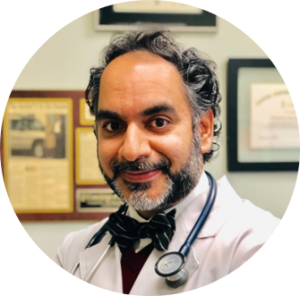Telemedicine Security — Is the Doctor on the Other End Really a Doctor?

Samir Qamar, CEO
With the advancement of any new industry, new crimes will follow, particularly as that industry is still finding its place. Guidelines, certifications, and even legislation arise out of necessity, many times after nefarious activity takes advantage of a nascent field- Telemedicine is no exception.
Imagine the following scenario:
Via an attractive website, a patient finds a new doctor online. His name is Dr. Jones, and he offers convenient telemedicine appointments. A quick Google search for Dr. Jones checks out- he’s licensed by the medical board, lots of nice reviews, and a very professional photograph. Through the website, the patient makes an appointment for a phone-based visit as there is no video option. Payment by credit card is required prior to the visit, also not a problem. Payment is made, and the patient waits for the appointment to start. There’s just one problem, it isn’t Dr. Jones on the other end. It’s someone impersonating the real Dr. Jones to collect credit card transactions.
The scenario described isn’t farfetched, and actually happened to a physician in a reputable Nevada medical practice. A fake website had been created to impersonate the practice and its physicians, offering “telemedicine” visits. Visits were limited to phone so not to “inconvenience” patients who didn’t have video capability – a clever way to avoid detection. Thankfully, after copyright and fraud claims with numerous search engines, web hosting sites, the FTC, the FDA, and the medical board, the imposter site was taken down quickly and nobody was hurt. Resources spent in rectifying the issue were considerable.
I was recently informed there has been a growing trend with similar cases within telemedicine, which was alarming to say the least. I found myself reflecting on ways patients and telemedicine institutions might protect themselves. Below are my three conclusions:
Video Telemedicine Visits Allow for Clinician Recognition –
In our age of misinformation, self-proclaimed medical experts, and “bad actors”, it is very important for patients to know they are communicating with an actual clinician, and not an imposter. It is easier for imposters to hide behind a phone or keyboard than a video screen. I wouldn’t be surprised if in the interest of public safety, medical boards begin to push for video telemedicine over all other communication modalities for this reason alone.
Telemedicine Institutions and Physicians Should be Vigilant –
The imposter website was discovered via a simple Google search during routine online presence management. Action was taken immediately, and damages were minimized. Telemedicine companies and their clinicians should routinely check for impersonators on web and app platforms, quickly reporting suspicious activity to the appropriate authorities.
Telemedicine Patients Should be Vigilant –
Patients seeking telemedicine services should only do so from established, legitimate companies that have a strong online presence with accessible contact information. Patients should also be aware that many states require initial video appointments, a feature that imposter services will avoid such as in the example above. If any doubt, call the main office to ensure the offered service is valid.
Telemedicine security is itself trying to keep up with the telemedicine industry. Though there are some concerns about the privacy and security, it should not adversely affect anyone’s trust in telehealth. The benefits outweigh the risks. As leaders in the industry, we must embrace rigorous standards and minimize threats to ensure telehealth can deliver on its promises.
Our team hopes to encourage others to share their experiences, so we can all overcome these challenges together and grow telemedicine to its fullest potential.
About the Author:
Dr. M. Samir Qamar is the CEO of MedWand. In 2014, after working with Google on telemedicine projects, Samir found a team of medical engineers and invented the MedWand to provide what he thought was the missing link in telemedicine — physical exams. Samir is a member of the MIT Technology Review Global Panel, American Medical Association, American Academy of Family Physicians, and several other organizations. In his spare time, when not reading tech and medical journals, he serves as healthcare analyst for Woodlock House Family Capital. Samir speaks six languages, and still practices medicine to both help patients and discover new technology to improve healthcare. He currently lives in Las Vegas.

